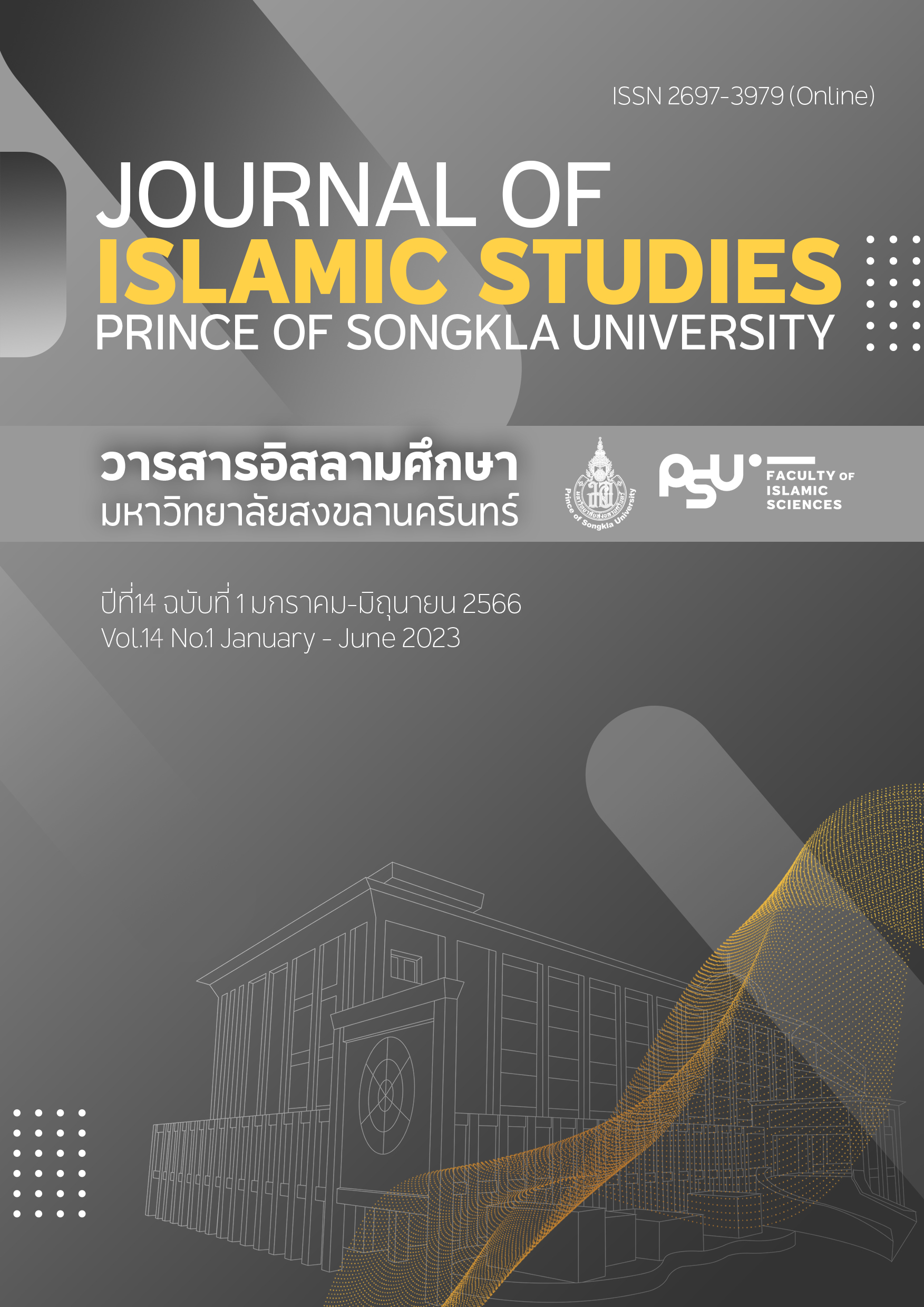The Development of Short-Term Course on Morality and Ethic According to Luqmanul Hakeem Teaching for Secondary Islamic Studies Stage Students
Keywords:
Short course, Moral and Ethics, The Teaching of Luqmanul Hakeem, Islamic StudiesAbstract
Objectives: 1) To develop and find the effectiveness of a short course on morality and ethics according to the teaching of Luqmanul Hakeem for Secondary Islamic studies stage students. 2) To compare the knowledge and understanding of learners studying the short courses on morality and ethics according to the teaching of Luqmanul Hakeem for Secondary Islamic studies stage students between before and after study. 3) To study the student's satisfaction with the Moral and Ethical Short Course Development Program. According to the teaching of Luqmanul Hakeem for Secondary Islamic studies stage students.
Methodology: The research is in the research article category. The population is Secondary Islamic Studies Stage students of Islam Sartr Wittaya School, No. 187, Moo 2, Sakam Subdistrict, Mayo District, Pattani Province, 400 students. The sample group was Secondary Islamic Studies Stage students of Islam Sartr Wittaya School 25 students. A method for obtaining a sample derived from purposive selection from the Secondary Islamic Studies Stage Students, 1st year, 2nd year and 3rd year.
The tools used in the research are divided into 4 categories: 1) A short course on morality and ethics according to the Teaching of Luqmanul Hakeem for Secondary Islamic Studies Stage students. 2) Evaluation questionnaire for students' morality and ethics after taking a short course on morality and ethics according to the teaching of Luqmanul Hakeem for Secondary Islamic Studies Stage students. 3) Academic achievement test for the development of a short-term curriculum on morality and ethics According to the teaching of Luqmanul Hakeem for Secondary Islamic Studies Stage students. 4) Satisfaction questionnaire on learning according to the short curriculum development on morality and ethics according to the teaching of Luqmanul Hakeem for Secondary Islamic Studies Stage students. Methods for checking tools by 3 experts checking the quality of research tools by applying the curriculum to Secondary Islamic studies Stage students.
Research method was divided into 2 steps as follows, 1) the curriculum development stage with 3 specialists checking curriculum quality, 2) the study of the curriculum implementation results, where 3 experts examined the quality of research tools by applying the curriculum to secondary Islamic studies stage students. The samples were 25 students from Islamsart Wittaya School which were selected by purposive sampling.
Research Findings: 1) The efficiency of the short course on morality and ethics by using the training course was higher than the specified criteria 80/80, which is 80.37/89.73. 2) The achievements of students in the short course on morality and ethics according to the teaching of Luqmanul Hakeem, which scores higher than before with statistics at level .01 3) Satisfaction of secondary Islamic studies stage students towards the short course development on morality and ethics according to the teaching of Luqmanul Hakeem for Secondary Islamic Studies stage students was at the highest level.
Contribution: 1) Bring the short course development course on morality and ethics according to the teaching of Luqmanul Hakeem for Secondary Islamic Studies stage students to be a curriculum that corresponds to the Muslim way of life. Therefore, it used and improved to be even more completed. 2) Schools should introduce a short course curriculum on morality and ethics based on the teaching of Luqmanul Hakeem for Secondary Islamic Studies stage students, to use in teaching and training of students in the future.
References
Bungatayong, M. (2009). Student development activities to instill Islamic ethics in students at secondary school private Islamic teaching Yala Educational Service Area Region [Thesis, Master of Arts]. Prince of Songkhla University.
Choo dtoh, N. (1997) Gaan pát-tá-naa lák-sà-nà ní-săi taang jà-rí-yá-tam săm-ràp dèk bpà tm-má-wai trít-sà-dee, naew kít láe naew bpà-dtì-bàt, ná-kon sà-wăn, kom-piw-dtêr aen gráaf fík. [Moral and ethical development of students at Satree Nonthaburi School Silpakorn University/Nakhon Pathom]. ISBN 9746352016.P.N. Printing.
Chutai Jenjit, P. (2002). Psychology of teaching and learning. Bangkok: Sermsin Prepress System. Teaching Psychology. Compact Print.
Luasmai, N. (2009) Gaan wí-jai láe pát-tá-naa rôop bàep gaan jàt gìt-jà-gam · pêuua srm sâang kun- ná-tam jà-rí-yá-tam · săm-ràp nák riian rá-dàp bprà-tm sèuk-săa [Research and development of activities to strengthen morality and ethics for elementary school students]. Chulalongkorn University. DOI : https://doi.nrct.go.th/ListDoi/listDetail?Resolve_DOI=10.14457/CU.the.2009.526
Sinlarat, P. (2019). Principles of curriculum and teaching management. Chulalongkorn University.
Sinthapanont, S. (2008). Teaching and learning innovation for youth quality development. Limited Partnership 9119. Technique Printing.
Srisa-at, B. (2008). Fundamentals of Educational Research. 4th printing. Printing coordinator.
Srisaark, B. (2003). Preliminary research. 7th edition. Suwi Richasan.
Sulong, A. (2018). Pondok Institutions: A Case Study of Curriculum and Teaching in the Past and Present. Yala Rajabhat University: Faculty of Education.
Taba, H. (1962). Curriculum Development : Theory and Practice. Harcourt Brace and World.
Tantirajanawong, S., & Tawisuwan, S. (2009). Gaan sòng srm kun-ná-tam têe mee · bprà-sìt-tí-pâap · gor-rá-nee sèuk-săa glùm dèk · yao-wá-chon láe kâa râat-chá-gaan pâak rát · raai ngaan [Promotion of existing virtues. Efficiency: A Case Study of a Child Group Youth and government officials, report]. Department of Religious Affairs Research Report Ministry of Culture
Typography, Bangkok P.N. Printing. (1997). Typography, ethical character: Bangkok P.N. Printing.
Yamareng, U. (2019). Training curriculum development. For Tadika teachers in Yala Province The development of an Islamic education curriculum at the school level according to the curriculum of Islamic studies of the mosque Early Islamic Studies. (Ibtidaiyyah) 2016. Yala Rajabhat University, Faculty of Education.
Downloads
Published
How to Cite
Issue
Section
License
Copyright (c) 2023 © The Author(s). Published by the Journal of Islamic Studies, Prince of Songkla University under the Creative Commons Attribution 4.0 International License.

This work is licensed under a Creative Commons Attribution 4.0 International License.
All articles Published in The Journal of Islamic Studies are author’s opinions, and not the responsibility of the Faculty of Islamic Sciences nor the editorial board. However any citation should be referred to the journal.
















